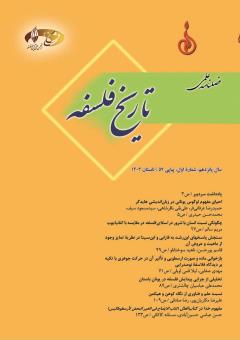تحلیلی از چرایی پیدایش فلسفه در یونان باستان
محورهای موضوعی : Geneology of philosophical schools and Ideas
1 - استاد گروه فلسفه و کلام اسلامی، دانشگاه پیام نور، تهران، ایران
کلید واژه: فلسفه, دین, یونان باستان, ادیان شرقی, پرسشهای بنیادین فکری,
چکیده مقاله :
بسیاری از مورخان غربی فلسفه، مدعیند که «فلسفه» نخستینبار، در قرن هفتم تا ششم پیش از میلاد، در یونان باستان بوجود آمد. سؤال اینجاست که چرا آنچه امروزه «فلسفه» خوانده میشود، اولینبار در یونان باستان و مغربزمین بوجود آمد؟ پاسخ نوشتار حاضر به این پرسش، بر کاستیهای دین یونان باستان بعنوان عاملی تعیینکننده برای پیدایش فلسفه در یونان باستان تمرکز دارد. اندیشۀ محوری در این پاسخ اینست که فرهنگ دینی یونان باستان، بواسطۀ فقر در جهانبینی، معرفتشناسی، اخلاق، کیهانشناسی و هستیشناسی، و نیز بدلیل محدودیتهای در موضوع، روش و غایت، شرایط و زمینه را برای پیدایش و طرح پرسشهایی بنیادین فراهم ساخت که برای آن دین بیگانه بودند و طبیعتاً برای آنها پاسخی نداشت. فلسفه آمد تا به این پرسشها پاسخ دهد. بر مبنای رویکرد این پژوهش، اگر بجای آن دین فقیر و حداقلی، دین دیگری در یونان باستان وجود میداشت که: 1) دارای جهانبینی، نظام معرفتشناسی، اخلاق، کیهانشناسی و هستیشناسی بود، 2) در روش، موضوع و غایت نیز با پرسشهای فوق بیگانه نبود، و 3) از امکانات تصوری و تصدیقی لازم برای تأمل پیرامون آن پرسشها برخوردار بود، یونانیان باستان هم از فلسفه ـیا دستکم آن بخش از فلسفه که به آن پرسشها میپرداختـ بینیاز میشدند.
A great number of Western historians of philosophy claim that philosophy emerged for the first time in Greece in the 7th-8th centuries BC. The question is why what is presently called philosophy came into being for the first time in ancient Greece and the West. The present paper focuses on the religious defects in ancient Greece as a determining factor in the rise of philosophy in this land. The main argument behind this response indicates that the religious culture of ancient Greece, because of its poverty in terms of worldview, epistemology, ethics, cosmology, and ontology, as well as certain limitations in subject, method, and end, paved the context for the rising and posing of some fundamental questions that were strange to that religion, which was naturally incapable of responding to them. It was at this point that philosophy emerged to answer such questions. The findings of this study indicate that if, instead of that poor and limited religion, there had been another religion there, ancient Greeks would have become needless of philosophy, or that part of philosophy that dealt with those questions. The replacing religion should have enjoyed the following features: 1) possessing a solid worldview and well-founded systems of epistemology, ethics, cosmology, and ontology; 2) being familiar with the raised questions in terms of method, subject, and end, and 3) enjoying the necessary conceptual and judgmental capabilities to deliberate over those questions.
تورات (2005) ترجمه قدیم، انتشارات ایلام.
آذرگشسب، فیروز (1379) گاتاها یا سرودهای آسمانی زرتشت، برگردان به فارسی، تهران: فروهر.
خراسانی، شرفالدین (1382) نخستین فیلسوفان یونان، تهران: علمی و فرهنگی.
دکرشنتزو، لوچانو (1383) فیلسوفان بزرگ یونان باستان، ترجمۀ عباس باقری، تهران: نشر نی.
سهروردی، شهابالدین (1372) مجموعه مصنفات شیخاشراق، ج2، تهران: مؤسسۀ مطالعات و تحقیقات فرهنگی.
کوهن، ابرهام (1382) گنجینهیی از تلمود، ترجمۀ امیر فریدون گرگانی، تهران: اساطیر.
Anaxagoras (2017). Fragments. ed. by T. Anderson. trans. by J. Burnet. CreateSpace Independent Publishing Platform.
Aristotle (1984). The Complete Works of Aristotle, ed. by Barnes, Princeton: Princeton University Press.
Bowra, C. M. (1957). The Greek Experience, London: Weidenfeld & Nicolson History.
Boyce, M. (1975). A History of Zoroastrianism, The Early Period, Vol. 1, Leiden: Brill.
Burkert, W. (1985). Greek Religion. Cambridge: Harvard University Press.
Burnet, J. (1920). Greek Philosophy: Thales to Plato. London: A & C Black Ltd.
Cicero, M. T. (1979) De Natura Deorum; Academica, trans. by H. Rackham, Cambridge: Harvard University Press.
Cunningham, L. S. & Reich, J. J. (2006). Culture and Values. Vol. 1, Belmont, CA: Thomson/ Wadsworth.
Diogenes Laertius (1925). Lives of Eminent Philosophers, Vol. II, Books 6-10, trans. by R. D. Hicks, Cambridge: Harvard University Press.
Everett, G. (2022). The Book of Esther: Study Notes on the Holy Scriptures. online: https://www.academia.edu/17903628/The_Book_of_Esther_2022_edition_
Heraclitus (1987). Fragments. ed. and trans. by T. M. Robinson, Toronto: University of Toronto Press.
Hesiod (1914). Theogony. trans. By H. Gerard & E. White. New York: G. P. Putnam’s Sons.
Hirsch, E. G. & König E. (2021) commandments-the-ten. Jewish Encyclopedia. https://www.jewishencyclopedia.com/articles/4567-commandments-the-ten.
Homer (1919). The Odyssey. trans. by A. T. Murray, Cambridge: Harvard University Press.
Homer (1924). The Iliad. trans. by A. T. Murray, Cambridge: Harvard University Press.
Jaspers, K. (1949). The origin and Goal of History. trans. by M. Bullock, New Haven: Yale University Press.
Kohler, K. & Hirsch, Emil G. (2021) Ethics. Jewish Encyclopedia. https://www.jewishencyclopedia.com/articles/5888-ethics
Kohler, K. & Lauterbach, J. Z. (2021) Theology. Jewish Encyclopedia. https://www.jewishencyclopedia.com/articles/14362-theology.
Malandra, W. W. (1971). The Fravaši Yašt, Ph.D. diss., Philadel¬phia: University of Pennsylvania.
Otto, W. F. (1954). The Homeric Gods: The Spiritual Significance of Greek Religion. New York: Pantheon.
Perry, A. (2019). Job, UK: Willow Publishing.
Plato (1997). Complete Works. ed. by J. M. Cooper, Indianapolis: Hackett.
Rosivach, V. J. (1994). The System of Public Sacrifice in Fourth Century (B.C.E.) Athens, Atlanta, Georgia: Scholars Press.
Xenophanes (1898). Fragments. ed. and trans. by A. Fairbanks, London: K. Paul.
Zagzebski, L. T. (2007). Philosophy of Religion: an historical introduction. Oxford: Blackwell.

